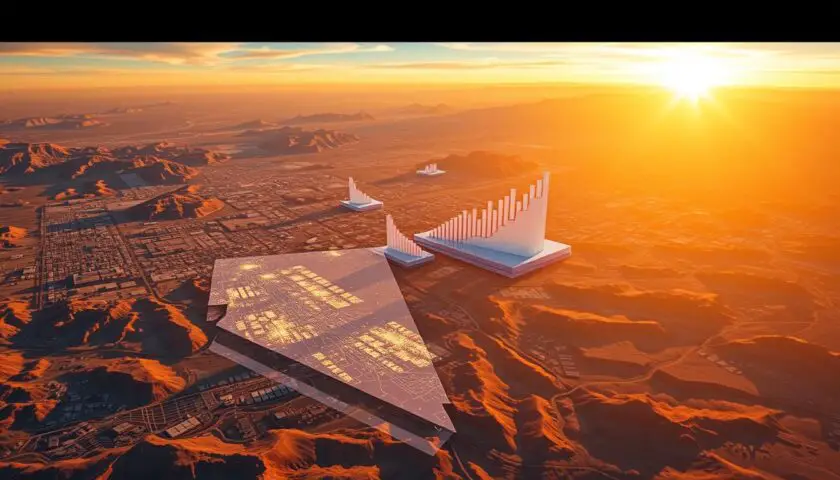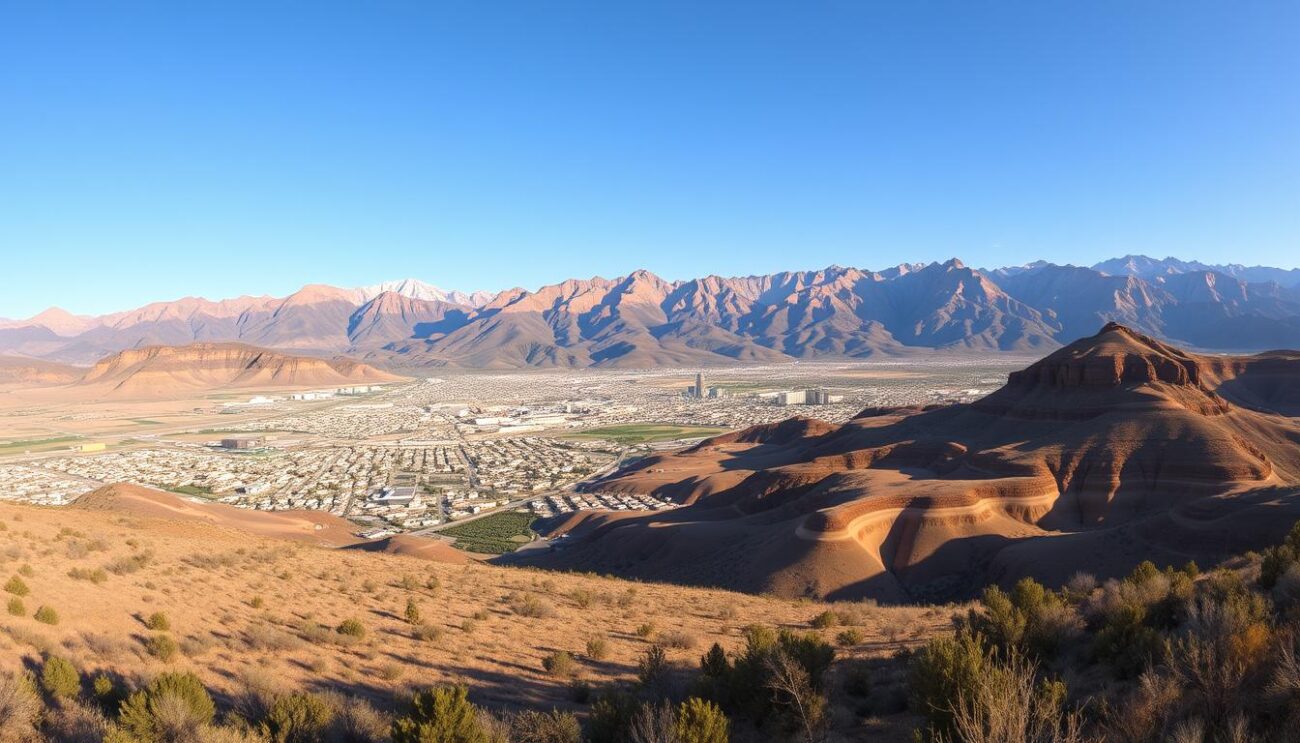Clark County’s population is expected to hit 3 million by 2042. This rapid growth is due to people moving from California and a booming economy. The county’s growth rate is 1.5% each year, much higher than the national rate of 0.7%. This makes the nevada population 2025 a key topic.
The growth in Nevada’s population is affecting its infrastructure, housing, and healthcare. The state has set aside over $60 million for affordable housing. As the population grows, it’s crucial to think about how it will impact the state’s resources and infrastructure.
Key Takeaways
- Nevada’s population is projected to continue growing, with Clark County reaching 3 million residents by 2042.
- The average annual growth rate for Clark County is 1.5%, higher than the national average of 0.7%.
- The state’s economy, driven by the leisure, hospitality, and healthcare sectors, is a significant contributor to population growth.
- Migration from California, driven by factors such as lower cost of living and favorable tax conditions, is a significant contributor to population growth.
- The state is taking steps to address the increasing demand for housing, with over $60 million allocated to provide affordable housing solutions.
- The population growth has significant implications for the state’s infrastructure, housing, and healthcare services, making nevada demographic forecast a critical topic for discussion.
Current Demographic Landscape of Nevada
Nevada’s population is expected to keep growing. Nevada census projections show a big increase in residents by 2025. This growth is due to economic development and people moving to the state.
Clark County, which has Las Vegas, is expected to have 2.5 million people by 2031. This mirrors the overall trend of Nevada’s population increasing over the years.
https://www.youtube.com/watch?v=tkKzk4ZZVTc
Nevada’s population is diverse, with both urban and rural areas. The Las Vegas area has an average of 4,376 people per square mile. The median household income is $63,276, and the poverty rate is 11.4%.
Looking at the median age and racial makeup gives us more insight. Nevada’s median age is 38.1 years. The racial mix includes White, Black, Hispanic, and Asian populations.
Nevada Population 2025: Comprehensive Forecast Analysis
The latest nevada population statistics show the state’s population will keep growing. Clark County is expected to see the biggest increase, with a population of 2,462,122 by 2025. This growth will put a strain on the state’s infrastructure and services.
Washoe County’s population is also expected to rise, but at a slower pace. By 2025, it’s projected to have 526,437 people. Economic growth, migration, and new housing will drive these increases.
Looking closer at the data, we see some trends:
- Clark County: 2,462,122 (2025), 2,515,042 (2026), 2,561,749 (2027)
- Washoe County: 526,437 (2025), 533,544 (2026), 539,098 (2027)

The projections are based on many factors, like job changes and economic shifts. The REMI model is used to forecast these changes. It considers job shifts from Q2 2022 to Q2 2023.
| County | 2023 Population | 2025 Population | Growth Rate |
|---|---|---|---|
| Clark County | 2,361,285 | 2,462,122 | 2.2% |
| Washoe County | 508,759 | 526,437 | 0.4% |
Driving Forces Behind Nevada’s Population Changes
Nevada’s population is growing due to several reasons. These include economic growth, job market changes, and migration patterns. Nevada demographic trends show the state’s economy is becoming more diverse. This includes growth in logistics and manufacturing, which creates new jobs.
The state is also investing in education and infrastructure. For instance, Governor Joe Lombardo wants to spend $140 million on pre-K programs. This will help families and support the workforce. Nevada is also focusing on renewable energy and water conservation to protect the environment.
Migration patterns are another key factor in Nevada’s growth. People are moving from states like California to Nevada. They are attracted by affordable housing, lower taxes, and a business-friendly environment. But, this growth also means more demand for housing and infrastructure.
The table below highlights some key factors behind Nevada’s population growth:
| Factor | Description |
|---|---|
| Economic growth | Diversification of industries, investments in education and infrastructure |
| Migration patterns | Influx of people moving from other states, driven by affordable housing and lower taxes |
| Environmental considerations | Investments in renewable energy and water conservation efforts |
Nevada’s population growth is influenced by many factors. These include economic growth, migration, and environmental efforts. Understanding these factors is key to developing good policies for Nevada’s growing population.
Conclusion: Future Implications for Nevada’s Growth
The Nevada population forecast looks bright, with growth and changes expected by 2025. The forecast shows Nevada’s population will grow, thanks to economic chances and people moving there. This is changing the state’s look.
As more people move to Nevada, the state will need to invest in things like roads, homes, and services. Leaders and local groups must plan ahead. They need to make sure Nevada’s communities can support the new residents.
Nevada’s economy is also changing, with more jobs beyond tourism. This will bring in skilled workers. But, Nevada must update its schools and job training to meet employer needs.
In summary, Nevada’s future looks promising with growth and change. By understanding these trends, Nevada can grow and succeed. It can use its strengths and tackle challenges for a bright future for all.
FAQ
What is the current population of Nevada and how is it projected to change by 2025?
Nevada’s population is around 3.2 million as of 2020, according to the latest census. Experts predict it will grow to 3.5 million or more by 2025. This growth is due to economic opportunities, migration, and favorable living conditions.
What are the key demographic trends and indicators in Nevada?
Nevada’s population has grown fast, with Clark County leading the way. The state’s people are generally young, with a median age below the national average. There’s also more racial and ethnic diversity, with growing Hispanic and Asian populations.
What are the main factors driving Nevada’s population growth and how will they shape the 2025 forecast?
Economic opportunities and favorable living conditions are key drivers of Nevada’s growth. Job market growth and an affordable climate attract people. Migration, both from within the U.S. and internationally, also plays a big role.
What are the potential challenges and opportunities presented by Nevada’s population forecast for 2025?
Nevada’s rapid growth, mainly in cities, brings both challenges and opportunities. There’s a need for more infrastructure and public services. But, the influx of new residents and businesses could boost the economy and diversify the state.
How will Nevada’s population changes affect the state’s long-term growth and development?
The 2025 population forecast is crucial for Nevada’s future. Leaders must plan for housing, transportation, education, and environmental needs. This ensures Nevada can support and benefit from its growing population.
Source Links
- https://www.primmnevada.net/clark-county-population/
- https://dailymontanan.com/2025/01/13/immigration-drives-nations-population-growth/
- https://lasvegassun.com/news/2025/jan/17/preview-las-vegas-speaker-highlights-southern-neva/
- https://nchstats.com/las-vegas-population-growth/
- https://www.census.gov/library/stories/state-by-state/nevada-population-change-between-census-decade.html
- https://www.census.gov/programs-surveys/popproj.html
- https://tax.nv.gov/wp-content/uploads/2024/10/Nevada-County-Population-Projections-2024-to-2043.pdf
- https://thenevadaindependent.com/article/10-issues-to-watch-during-nevadas-2025-legislative-session
- https://nevadabusiness.com/nevada-economic-development/
- https://urbanland.uli.org/development-and-construction/the-growing-momentum-to-expand-nevadas-manufacturing-industry
- https://www.leg.state.nv.us/division/fiscal/economic forum/2024FinalReport.pdf
- https://www.newtraderu.com/2025/02/05/americas-middle-class-is-fleeing-to-these-10-states-in-droves-in-2025/
- https://nshe.nevada.edu/html/wp-content/uploads/file/BoardOfRegents/Agendas/2025/01-jan-mtgs/refs/bor1617/BOR-12a.pdf
I am Lazar Bojic, an established professional in digital marketing with almost a decade of experience. Specializing in an array of niches has been my main strength as a content creator. Besides being a content writer, I have participated in creating various other content types, including infographics and script writing for video content creators, across numerous niches. Among my standout works, content creation at wikibiography.in certainly holds a special place.

